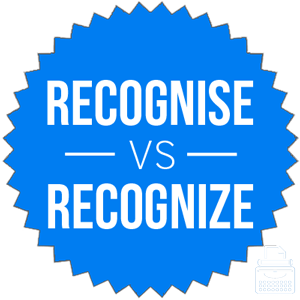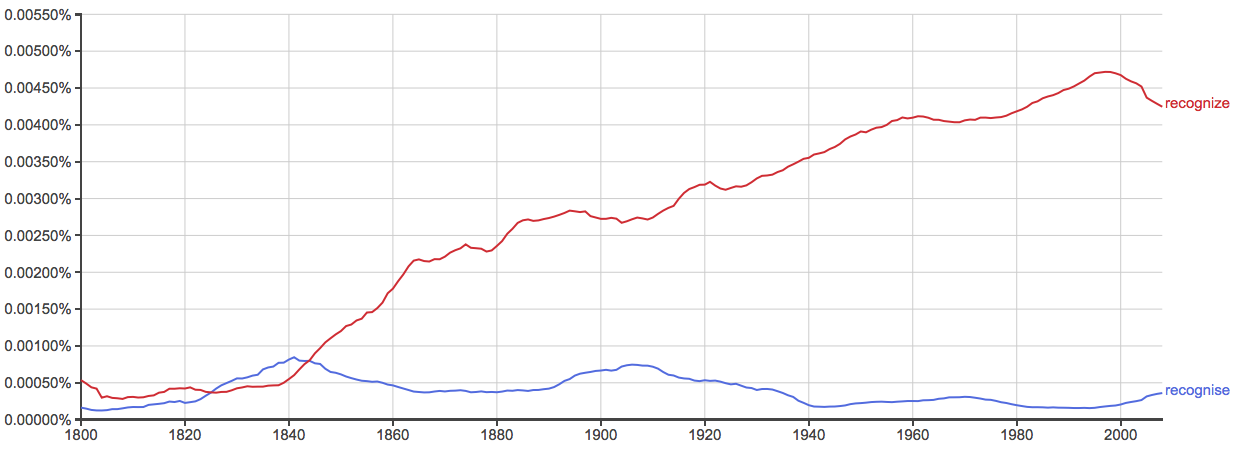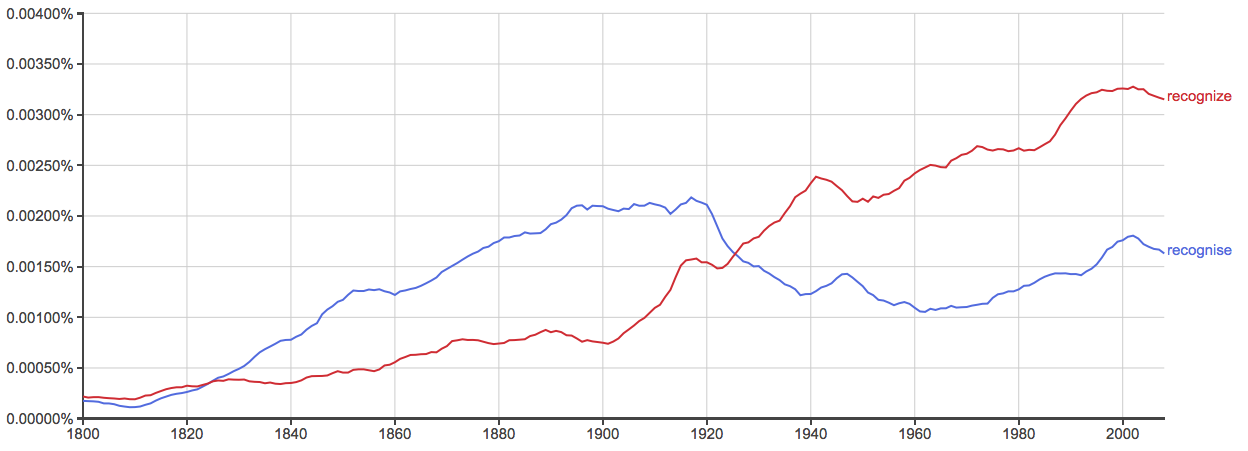в чем разница между recognise и recognize
В чем разница между recognise и recognize
Recognise is the British spelling, recognize is the US spelling
Recognise is the British spelling, recognize is the US spelling
Символ показывает уровень знания интересующего вас языка и вашу подготовку. Выбирая ваш уровень знания языка, вы говорите пользователям как им нужно писать, чтобы вы могли их понять.
Мне трудно понимать даже короткие ответы на данном языке.
Могу задавать простые вопросы и понимаю простые ответы.
Могу формулировать все виды общих вопросов. Понимаю ответы средней длины и сложности.
Понимаю ответы любой длины и сложности.


Решайте свои проблемы проще в приложении!

В чем разница между recognise и recognize
Символ показывает уровень знания интересующего вас языка и вашу подготовку. Выбирая ваш уровень знания языка, вы говорите пользователям как им нужно писать, чтобы вы могли их понять.
Мне трудно понимать даже короткие ответы на данном языке.
Могу задавать простые вопросы и понимаю простые ответы.
Могу формулировать все виды общих вопросов. Понимаю ответы средней длины и сложности.
Понимаю ответы любой длины и сложности.


Решайте свои проблемы проще в приложении!

В чем разница между recognise и recognize
recognise is an alternate spelling, mostly in British English. But recognize is more common in both American and British English
Символ показывает уровень знания интересующего вас языка и вашу подготовку. Выбирая ваш уровень знания языка, вы говорите пользователям как им нужно писать, чтобы вы могли их понять.
Мне трудно понимать даже короткие ответы на данном языке.
Могу задавать простые вопросы и понимаю простые ответы.
Могу формулировать все виды общих вопросов. Понимаю ответы средней длины и сложности.
Понимаю ответы любой длины и сложности.


Решайте свои проблемы проще в приложении!

Recognise or Recognize – What’s the Difference?
Home » Recognise or Recognize – What’s the Difference?
Differences between American and British English are well catalogued, and come in the form of verb conjugation, word use, and even spelling.
One of the more consistent differences between the two language communities (American and Britain) involves the American tendency to change the –ise ending to –ize, to more closely reflect its spoken pronunciation. This trend can be seen in a number of words, including idealize, realize, baptize, criticize, and, of course, our word today recognize.
Even the British seem to be coming around to the –ize ending, though. They use both recognise and recognize. Which version should you use? Continue reading to learn more about the differences between these two confusing words.
What is the Difference Between Recognise and Recognize?
In this post, I will compare recognize vs. recognise. I will use each of these words in example sentences that will display the words in their appropriate contexts.
I will also show you a memory tool that makes choosing either recognize or recognise much easier in your own writing.
When to Use Recognize

Babies can accurately recognize emotions in strangers’ faces from a very early age. Someone who recognizes that his or her own behavior is a problem is probably on a path to self-improvement.
Here are a few more examples,
Recognize is a modification of a French verb. The French borrowed it from Latin. It was first recorded in English in 1537.
When to Use Recognise

Recognise is more common in British English than it is in American English.
That said, even the British prefer recognize—and have for some time.
The charts below show the relative usage of recognise vs. recognize in both language communities:
American English:
British English:
These charts aren’t exhaustive in their data, since they only look at books published in English since 1800, but they still provide a good visualization of an important long-term usage trend.
Trick to Remember the Difference
In most cases, you should default to recognize. It is acknowledged in both main forms of English.
If you are writing for an editor from the United Kingdom who insists on recognise, don’t feel bad about using it. It is an accepted variant. In most cases, recognize is a better choice since it will be familiar to all readers.
Since recognise has an S, like the British town of Surrey, remembering that recognise is chiefly a British variant should not be difficult.
Summary
Is it recognise or recognize? Recognize and recognise are spelling variants of a verb that can means to identify, to acknowledge, or to see something as legitimate.
Recognize vs recognise
Recognize means to remember, acknowledge truth or legal authority, or to realize something.
British English lists an alternate spelling as recognise, but the main entry is recognize. North Americans (yes, that includes Canada) prefer the ize spelling, and this is accepted everywhere. However, outside North America some prefer the ise spelling and it is not incorrect. This spelling change goes across all derivatives including: recognizability, recognisability, recognizable, recognisable, recognizeably, recognisably, recognizer, and recogniser.
The ize/ise change is based in English being influenced by French, and every other language. The Greek words changed to Latin, which used a z, but the French spelled it with an s. Purists in England promote the original ize while others stick with convention, ise.
But on April 15, the European Parliament joined Vatican City and 22 other nations in recognizing the Armenian genocide and called upon Turkey to do the same. [The Boston Globe]
“We had some really strong performances last year (at the galas), but maybe the recognizability factor (of the hosts) wasn’t as strong.” [Winnipeg Free Press]
When the UN General Assembly voted to recognise the newly born Jewish state on November 29, 1947, Greece abstained. [The Jewish Chronicle Online]
The update adds features such as hands-free actions, always-on apps, WiFi support and an emoji recogniser, all of which will help Android Wear devices like the LG Watch Urbane and Moto 360 compete with the Apple Watch. [The Telegraph]
Tipping the scales at almost half a stone, it is a weighty book, literally and figuratively, and one that provides valuable illumination on the question of what exactly it is that makes a garden recognisably Irish. [The Irish Times]









